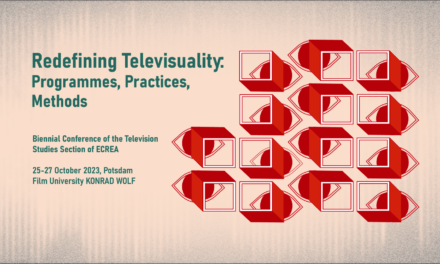
Channel 4’s recent foray into foreign-language television drama, Deutschland 83, highlights a preoccupation of contemporary culture, and of contemporary television, with identity. The mediation of this theme/meme through popular television in particular has taken many dramatic and representational forms. But significantly, one of the most interesting developments of this sense of identity has been the acquisition and broadcasting of foreign-language dramas. In an age of so-called ‘Post-national’ concepts and transnational communications, the ‘national’ and its narratives of difference has paradoxically become ‘hip’ in the television drama world.
Channel 4’s Walter Presents is just one example of a broadcaster that, following in the footsteps of BBC4’s recent successes with The Killing, The Bridge, et al, is offering to showcase dramas from all over the world. Deutschland 83 is just one of these dramas. It is a broadcasting strategy and trend in popular television that recognises what Katja Valaskivi identifies as ‘Cool Nation’ branding; a branding that has understood how the national is also foreign and exotic and therefore has potential transnational appeal through a dichotomy of local/global identity.
I don’t want to suggest, however, that Deutschland 83 is particularly serious or self-conscious about how it discusses themes of identity through its narrative; It isn’t, despite the fact that its story focuses on the ideological division of nation and national identity during the Cold War. In this last respect, and if anything, the series suffers from a dramatic identity crisis.
This perceived identity crisis was unknowingly confirmed by the programme’s producer, Jorg Winger, in an interview for the ‘Goethe-Institut’, London. Winger recounted how he had carried the idea for the story around with him for a while, “wondering if I could make a comedy, crime story or thriller out of it.” (Anna Schiller/Magnus Polcher, Goethe-Institut, February 2016). In the end, he tried all three. Promoted as a Cold-War espionage drama, it was a far cry from the more intense (paranoid?), and topically-minded espionage drama Homeland which it replaced in the Sunday evening schedule (UK).
The interview for the Goethe-Institut was a salutary lesson in many respects, because had I not read it, I would now be talking about how the programme had tapped into various transnational and global marketing/production strategies, and pursued self-reflexive creative approaches such as ‘Double Occupancy’ (Elsaesser), and more recently, Katja Valaskivi’s concept of ‘Cool Nations’ branding (2016). I am still going to talk about Deutschland 83 in these and other terms, but it is worth considering the serendipity which Winger alludes to elsewhere in his interview for the Goethe-Institut.
In his interview, Winger describes how Deutschland 83 became a transnational/global drama at the scriptwriting stage, and largely by accident. This was because the screenplay was originally written in English and later translated into German for the German broadcaster RTL. As Winger relates:
“It was never supposed to be an international series and we never expected it to go in that direction…A colleague in England sent the English [version] script to… Sundance TV… if the writing process had been in German, the script would never have made it to London.” (Anna Schiller/Magnus Polcher, Goethe-Institut, February 2016)
Deutschland 83, therefore, was not made with the concept of ‘Double Occupancy’, or ‘Cool Nation’ branding in mind (at least not by the scriptwriters). In other words, the drama was not originally conceived of in terms of transnational/global appeal through a conscious self-reflexive and self-exoticising form of “performative self-display” of national identity (Elsaesser 2015) for foreign audiences.
For Elsaesser, as well as for myself, this act of self-display or conscious awareness of how national traits, characters, stories appeal transnationally, are significant (but not crucial) elements in understanding not only the dimensions of transnationalism, but also the ways in which contemporary national television has re-invented and re-branded the national for external/global use. As Elsaesser observes, “Post-national pastiche, as well as ‘self-othering’ represent more fluid forms of European identity” (2013), and as a consequence the transnational appeal of such programmes is not through an antagonistic assertion of identity in difference, but through the “impersonation of difference” (Elsaesser 2013). There is no ‘impersonation’ of ‘difference’ in Deutschland 83 other than the dramatic representation of East German difference, and this is significant.
The potential transnational appeal of Deutschland 83 (it has received mixed reviews) therefore lies in a related, but different area of self-exoticism. This concerns retro culture, and the dramatic scenario and story of the series; its depiction of a paradigm of western cultural history – the Cold War – and the popular narratives surrounding German re-unification were a catalyst for change, including changes in modern identities.

In many respects, the DDR, and communist Eastern Europe in general, were both Germany’s and Europe’s exotic ‘other’. In terms of the television series therefore, it is not contemporary Germany that appeals transnationally, but its exotic other (the DDR) and its depiction of how the world used to be until very recently – television, communications, national identities, attitudes, etc. These elements, which have formed a large part of retro culture (very different to nostalgia) have proved equally exotic to contemporary television audiences, and their appeal, re-inscribed through a variety of local dynamics, have proved to be equally transnational.
On a dramatic level, the series does not do this very well (a dramatic identity crisis), and in some respects its representation of the times and attitudes depicted bares a similarity to the popular cultural phenomenon of Ostalgie, a phenomenon which Enns, in his essay The politics of Ostalgie, suggested was intrinsically linked to television (2007: 476). Ostalgie, as Boyer suggests, was “less a symptom of East German nostalgia then [sic] of West German Utopia” (2006: 361). The phenomenon, as evinced by television programmes such as the DDR Show, and films such as Good Bye Lenin, was both lighthearted and euphoric in nature, and these themes or attitudes seem to influence Deutschland 83. Ostalgie branded the DDR and its national identity for wider appeal and consumption in interesting and highly symbolic ways. Deutschland 83, therefore, although not intended “as an international series”, refers to a time in recent history and a process of self-exoticism that was widely appealing beyond the borders of Germany, and more significantly, was re-inscribed at various local levels.
For Germany in particular, and Europe in general, we can consider the ways in which the DDR and the communist East represents a process of ‘self-othering’ to be understood transnationally. And this is also the case with concepts of retro culture and retro television.
The series makes great play of its references to the 1980s through music, fashions, brands (Sony Walkman), and just as Netflix’s Narcos uses actual newsreel footage to establish the narrative within a certain time period, with its attendant attitudes, so Deutschland 83 imports (what Ebbrect calls the ‘Migration’ of images to other texts and narratives, 2007) similar external texts into the narrative for both symbolic and aesthetic purposes. It is a short-hand process that also confirms Boyer’s wider message of a utopian present. For Guffey, this is a common feature of a retro culture (and retro television) that displays “subversive instincts” and which often side-steps historical accuracy, “allowing society to find ‘new ways to tell itself its own history’ (Guffey 2006: 9).
Already, the appeal for television dramas and non-fiction depicting recent history (Life On Mars, for example) has shown a move from 1970s to 1980s to meet the dynamics of the viewing audience, and Deutschland 83 can also be considered an example of this process/trend. If, as Enns believes, Ostalgie was largely a television phenomenon, then not only is Deutscland 83 an expression of Boyer’s “western utopia”, but we can also see it as a particularly national/local expression of a much wider, and transnational, retro culture. This is a culture that is strongly linked to transnational processes of self-exoticism, and ‘Cool Nation’ branding – intentional or otherwise.
As with Deutschland 83, The Bridge, and others, nation/national branding and national characteristics are part of the appeal of these television series, and television in particular, whether it be through global television formats, foreign-language dramas, or streaming services such as Netflix, has become significant in revealing the local/global dimensions of transnationalism. Further, although Deutschland 83may not have intended to be an international product, the “incessant memory work” (Elsaesser 2013) done by television – tele-visual media memory, eyewitness accounts, home movies, memorabilia – has ensured that the series can be approached by audiences through a variety of complex networks of meaning and affinity that confirms or disavows equally concepts of collective and personal identity.
For Channel 4’s Walter Presents, we can consider Katja Valaskivi’s concept of Cool Nations (2016) where the “transnational idea of ‘cool’ has circulated from popular culture, fashion, and marketing into describing nations” and into describing national television and its products (2016). In this respect, national television adapts to meet global competition, but it does so through branding national identities as ‘cool’, or for these purposes ‘exotic’. Does Deutschland 83 make German television ‘cool’? Is Deutschland 83 an example of nation branding in television? Walter Presents and Channel 4 seem to think so.
n.b. Thank you Elke Weissmann for our conversation on the merits/or otherwise of German television, and also German culture, kuchen, and wein.
Kenneth Longden has lectured as part of the academic staff at Liverpool John Moores University in Media, Critical, and Creative Arts, and studied for a MPhil/PhD in Transnational Narratives at The University of Winchester. He is a Fellow HEA, and a Peer-Reviewer for various academic journals. He has been published by Intellect Books and Palgrave MacMillan, and writes on Popular Narrative, Film, Television, Fandom, and Popular Culture.




